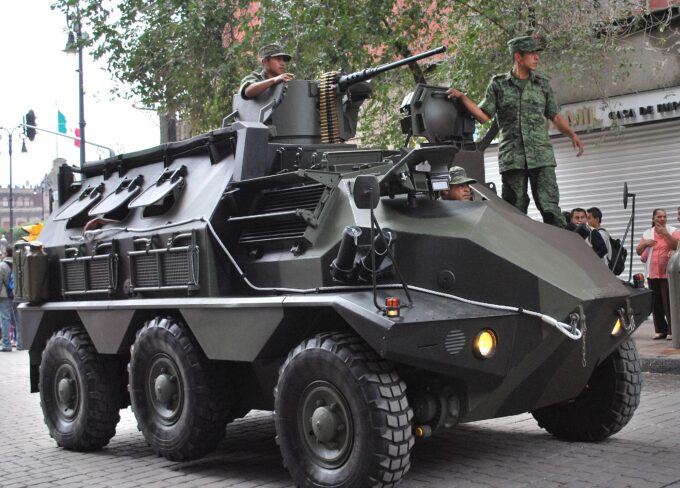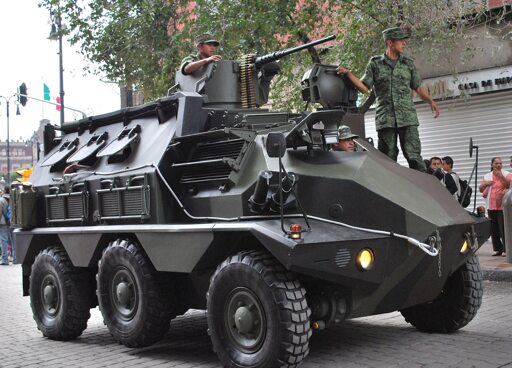

Photograph Source: Thelmadatter – CC BY-SA 3.0
“The military operates behind our backs,” says Pedro Uc Be. “We know they will start mining, but they work in darkness, and for that precise reason we haven’t been able to say anything concrete about it.”
Uc Be is a Mayan activist with Múuch’ Xíinbal, the Assembly of Defenders of Mayan Territory. He has been resisting megaproject developments on Mayan land for over a decade. Now, his land is threatened by military mining activity.
Government records show that Mexico’s Ministry of National Defense (SEDENA) holds 21 mining authorizations in Quintana Roo, which sits within the Yucatán biodiversity corridor that was fractured by the Tren Maya, a tourist train in the Yucatán Peninsula. Greenpeace has also identified at least 26 rock extraction sites approved to be deforested and dynamited in the area, most linked to the same military-owned venture.
SEDENA’s expansion from infrastructure construction to mining is symptomatic of a broader change in the role of Mexico’s Armed Forces. Once dedicated exclusively to issues of defense, Mexico’s military now manages and owns companies dedicated to mining, aviation, and hospitality. This commercial shift, enabled by opaque processes justified under the language of “national security,” has had destructive consequences for Mexico’s biodiversity and Indigenous communities.
Tren Maya Controversy
The Tren Maya started as a tourist transportation initiative launched by former president Andrés Manuel López Obrador (AMLO) to spur inclusive economic development in Mexico’s south. With an estimated cost of $28.6billion and counting—up from $7.5 billion at inception—the railway connects five states throughout the Yucatán Peninsula and includes stations, hotels, and museums, alongside urban development.
Despite its promises, the project was met with fierce opposition from Indigenous communities, environmental groups, and human rights watchdogs. UNESCO condemned the lack of environmental impact assessments, Mexican courts ruled that it violated the human right to a healthy environment, and the International Tribunal for the Right of Nature called the train initiative a “crime of ecocide and ethnocide.”
Facing mounting opposition, the government fast-tracked construction by invoking national security measures in the 2021 National Security Decree, which declared the Tren Maya and other megaprojects matters of importance to the public interest and national security. With this decree, the government circumvented constitutionally recognised obligations to implement prior consultation procedures, respond to transparency requests, and perform environmental and social impact assessments. The consequence, explained Uc Be, was that “our protections no longer had any effect.”
Thereafter, the military’s role expanded dramatically. SEDENA took over construction, and the National Guard—AMLO’s newly created public security force—began surveillance operations of Yucatan residents, with little accountability. Reports soon emerged of harsh working conditions, land expropriation, and violence.
Despite its administrative backing, the project has only drawn about 1,200 daily riders, far below the 33,000 that AMLO suggested would revitalize the region. In response, AMLO’s successor, President Claudia Sheinbaum, has rebranded the track as a cargo line. In February, she issued a public utility decree expropriating around 915,000 square meters of land, with compensation, for freight infrastructure.
But the military’s interests in the region go beyond building infrastructure. Currently, SEDENA is pursuing 21 mining permits to extract construction materials from Yucatán rock banks, a move that appears at odds with Sheinbaum’s own moratorium on new mining concessions.
“The mining is authorized as part of construction works associated with the Tren Maya,” says Aarón Siller, Regional Director at the Mexican Center for Environmental Law. Since [the Tren Maya] is considered a National Security project, exceptions can be made. It is practically a carte blanche.”
Mission Creep
Military power in Mexico has escalated since President Felipe Calderón (2006-2012) launched his controversial “War on Drugs.” The strategy, which failed to reduce drug crime and provoked accusations of human rights abuses, saw the Armed Forces deployed frequently into civilian spaces like toll roads and neighborhoods.
A longtime critic of the “War on Drugs,” AMLO rose to power in 2018 as a political outsider who promised to enact social change and “return the military to their barracks.” However, distrustful of what he perceived as a corrupt government establishment, he adopted legislative reforms that thrust a then relatively apolitical army into the public domain. Now, says Uc Be, “[the military] are everywhere: in airports, education, construction, hospitals, hotels, customs—everywhere.”
Between 2006 and 2023, 87 militarization initiatives transferring civilian functions to the Armed Forces were introduced in Congress. Among them were the 2017 Internal Security Law, which authorized military involvement in public security, and the creation of the National Guard, a new force that replaced the federal police and has effectively become an arm of the army.
As its presence expanded nationwide, the military also gained a foothold in the economy. The 2021 National Security decree paved the way for SEDENA to establish state-run companies through which it builds, owns, and operates major infrastructure. Today, the Ministry controls the Tren Maya, the national airline Mexicana, and 12 airports, including Mexico City’s Felipe Ángeles International—a stark transformation from its politically distant role just two decades ago.
In the face of criticism, AMLO maintained that the army was a reliable, convenient, and low-cost developer. He entrusted military engineers to construct 2,700 branches of the state-owned Banco del Bienestar, arguing they posed a lower corruption risk, and praised their efficiency and professionalism in major infrastructure works like airports and roads. During the COVID-19 pandemic, the army provided extensive frontline support and resources, leading the National Contingency Center, coordinating the nation’s emergency response, and operating 10 hospitals.
Despite SEDENA’s unbridled expansion into the public sector, Mexico’s leaders have remained silent on allegations of misconduct and corruption. Between 2020 and 2022, Amnesty International counted more than 1100 complaintsmade to the National Human Rights Commission against the National Guard for crimes including enforced disappearances, arbitrary detention, unlawful killing, and torture. The military has refused to disclose information about abuses and coverups.
Sheinbaum has meanwhile pledged continuity with AMLO’s mandate, deepening the military’s influence in the country. In July 2025, she introduced legislative reforms that increased SEDENA’s surveillance powers under the umbrella of national security. According to the digital rights organization R3D, the legislation “seriously exposes the population’s privacy and poses significant risks to the protection of personal data and human rights.”
Militarization as a Gateway to Commercialization
Though he pitched himself as a spokesperson for political integrity and social change, AMLO routinely invoked national security to override legal and environmental constraints. In so doing, he laid the groundwork for Mexico’s military to evolve into a state-backed facilitator of commercial opportunity.
[Content truncated due to length…]
From CounterPunch.org via this RSS feed


